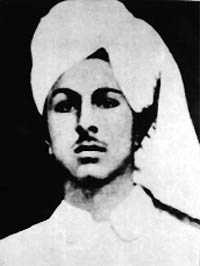After hanging, rewards
THE execution of Bhagat Singh, Rajguru and Sukhdev was carried out on March 23, 1931, in Lahore Central Jail by executor Kala Masih of Shahdra near Lahore. The execution was supervised by the then District Magistrate, Lahore, AA Lane Robert — a 1909 batch ICS officer, along with GT Hamilton Hardinge, a 1915 batch IP officer, the then SSP of Lahore. Apart from them, the then IG prisons (Punjab) Lt Col F.A Barker, the then IG Punjab Police Cherris Stead (1898 batch) were present. However, little did the officers know that the execution of Bhagat Singh would bring monetary and economic benefits for several others.
After the execution, the British government honoured several persons as detailed:
Hans Raj Vohra, Jai Gopal, Phonindra Nath Ghosh and Manmohan Bannerji — had all become government approvers and gave statements against them in the case. They were among the 457 witnesses produced by the Punjab Police in this case. After the executions, all four were rewarded. Vohra refused to take monetary benefits. But he was sponsored by the Punjab government to study in the prestigious London School of Economics.
After a Masters in political science, Vohra got a degree in journalism from London University and was the correspondent of the Civil and Military Gazette of Lahore till 1948. He later shifted to Washington and in the 1950s and 1960s was the Washington correspondent of a leading Indian daily. He died in July 1995, in Washington.
Jai Gopal got an award of Rs 20,000. Phonindra Nath Ghosh and Manmohan Bannerji got 50 acres of land each in Champaran district of Bihar (their home district) in lieu of their services and loyalty to the British government. The then jail superintendent, Major PD Chopra, was promoted as DIG, prisons, Punjab, two days after the hangings. The Deputy Jail Superintendent, Khan Sahib Mohammad Akbar Khan, who had started weeping after the execution of Bhagat Singh and his two companions, was suspended but later taken back as Assistant Jail Superintendent.
His title of Khan Sahib was, however, withdrawn on March 7, 1931. The IG, Prisons, Punjab, Lt Col FA Barker, was honoured with the Knighthood of Sir and sanctioned ex-India leave before retirement.
The DIG Prisons Punjab, Lt. Col. NR Puri, was promoted as IG Prisons Punjab after a few days of the execution. The Investigating Officer of the Lahore conspiracy case, Khan Bahadur Sheikh Abdul Aziz, SP, was given an out-of-turn promotion as selection grade SP, leading to his promotion as DIG three years later. His was the only example in 200 years of British rule in India, where a person who had joined as Head Constable retired as DIG (in July, 1937).
Khan Bahadur Abdul Aziz's eldest son, Masood Aziz, was appointed as Deputy Superintendent of Police by nomination in November, 1931 in the Punjab Police. Khan Bahadur was also given 50 acres of land in Lyallpur. Sudarshan Singh, DSP, who disposed the bodies of Bhagat Singh, Rajguru and Sukhdev, was promoted as Additional Superintendent of Police, Kasur. He later retired as SP of Punjab Police in September, 1942. Rai Sahib Pandit Sri Krishan, PCS, a Kashmiri from Lahore was the SDM, Kasur, at the time of the executions. He was a trial magistrate in this case earlier. He was given an “appreciation letter” by the Governor and later promoted as ADM, out of turn. Batala-born Sheikh Abdul Hamid, PCS, Additional District Magistrate of Lahore and Attock-born Rai Sahib Lala Nathu Ram, PCS, City Magistrate, Lahore were also given appreciation in person by the Governor of Punjab, FW DeMont'morency ICS (1899 batch). GT Hamilton Hardinge, SSP Lahore; Amar Singh, DSP; and JR Morris, DSP were given the King’s Police Medal. DSPs Amar Singh and Morris had accompanied DSP Sudharshan Singh of Kasur for the cremation of the three martyrs.
Appreciation letters were given to all constables and head constables, who accompanied the Police Officers by IG C Stead. The four articles written by Bhagat Singh, smuggled out of jail on the day of his execution by advocate Pran Nath Mehta, were later handed over to Bhagat Singh's companion Bijoy Kumar Sinha, who was sentenced to transportation for life and had concealed these papers at a friend's house in Jalandhar. The friend expected a police raid during the Quit India Movement days in July 1942 and burnt all of them in panic.
So, four bunches of papers, written by Bhagat Singh and handed over secretly on the last day of his life, and read by Pran Nath Mehta and Bijoy Kumar Sinha, were lost forever. Bijoy died in Patna on July 16, 1992. He disclosed in a seminar in the late 1980s that Bhagat Singh on the last day of his life had predicted that the Britishers would leave India in 14-15 years. Prophetic words indeed!
The executioner Kala Masih's son Tara Masih hanged Pakistan's Prime Minister Zulfiqar Ali Bhutto on November 4, 1979. During the British period, jail superintendents and senior officers in the Jail Department used to be from the Indian Medical Services and had to serve in the Indian Army before being posting in the Jail Department.
—The writer is an IAS officer of the Punjab Cadre.









